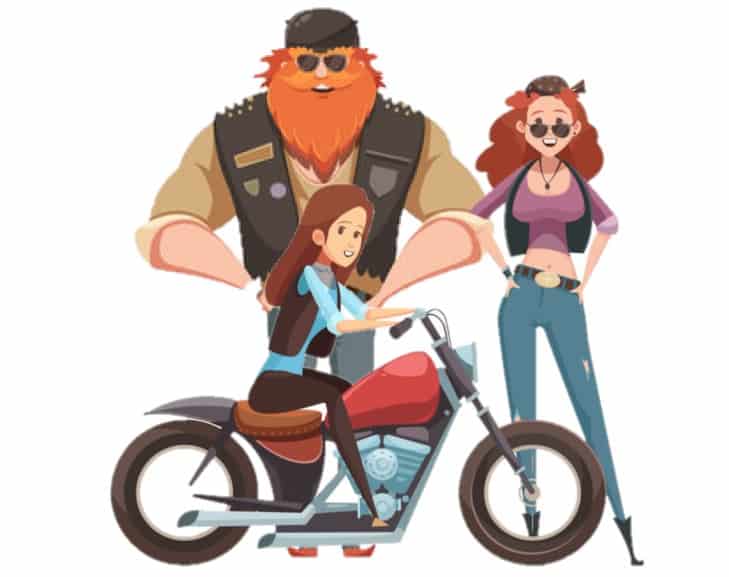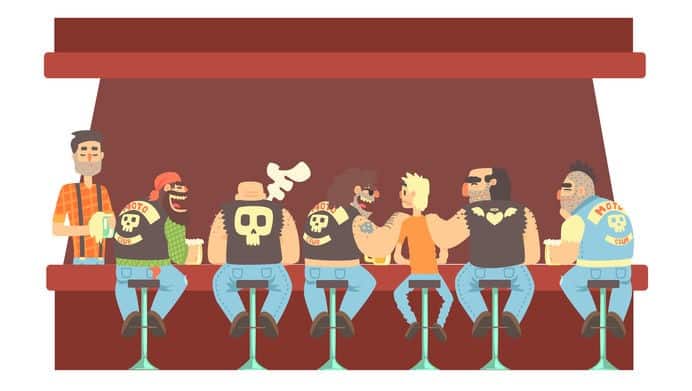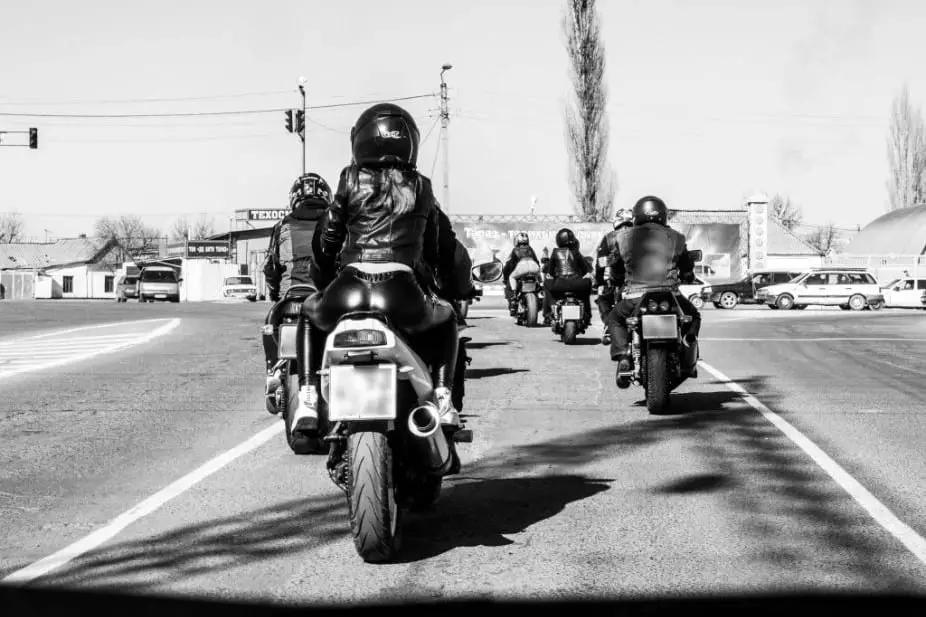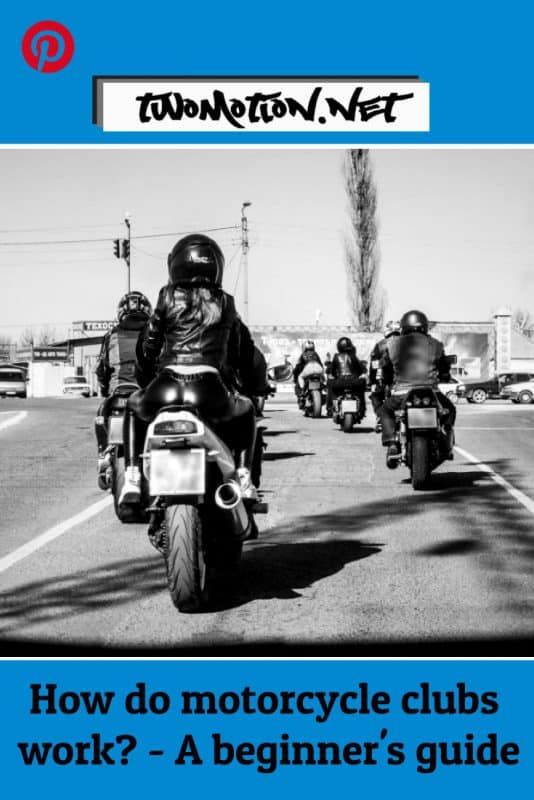There are various types of motorcycle clubs, and each one will work differently. What they all have in common is their primary purpose for existence, but other than that, they can differ quite a lot. These differences would include; their secondary purpose, internal organisation and club culture.
Overview
In this article, we look at how motorcycle clubs generally work. Though, you will have to remember that these might differ depending on locations around the world and the culture of their surrounding societies.
We will discuss the following:
- The different types of motorcycle clubs
- The purpose of a motorcycle club
- Internal organization of a club
- Club cultures
The different types of motorcycle clubs
Motorcycle clubs can be divided into five main types that are namely:
- MC – Motorcycle Club
- MCC – MotorCycle Club
- RC – Riding Club
- OC/OG – Owners Club / Owners Group
- MG – Moto Groups
MC – Motorcycle Club
MC’s are widely regarded as traditional motorcycle clubs even though they are historically a few odd years younger than MCC’s. These type of clubs generally have a very strong sense of tradition and don’t often change their way of doing things. Most MC’s have a very challenging process for new members that can take even a few years to complete. In a typical conversation, this is the type of club that people refer to when speaking of “motorcycle clubs”.
MCC – MotorCycle Club
When MCC’s first started, it was much different than it is today. People in these clubs wore formal suits and were considered gentlemen (early 1900s). In later years, they became more like MC’s regarding club traditions and style of clothing. Today, many of them have moved away from MC traditions (not all of them) and kind of form an intermediate section to bridge the large gap between the likes of MC’s and RC’s.
RC – Riding Club
Riding clubs are generally much less formal regarding traditions, requirements and type of motorcycle a member rides. Though, some do commit themselves to the traditions and procedures of MCC’s or MC’s. In most countries, only MC’s are allowed to wear back patches but I have seen back patches of RC’s where MC’s are not present in that particular country. To many people, this would be absurd or unheard of.
OC/OG – Owners Club / Owners Group
Owners Clubs or Owners Groups don’t really have an initialised name but it helps us with quick references in this article (so don’t bust your bollocks). OC’s may have some requirements that members need to adhere to, but they generally don’t require you to attend weekly meetings or ride a certain amount of miles each year. In essence, OC’s are not clubs in the normal sense at all. You generally become a member because you own a certain brand or model of motorcycle.
© 2020 Copyright twomotion.net
MG – Moto Groups
Moto Groups are based on the same principles as RC’s but don’t commit to the traditions or practices that you would find in other motorcycle clubs. This form of club has been increasing in recent years across Europe but can hardly be seen as an actual motorcycle club. This is more of a new-age development that is not confined to any method of establishing. The most notable differences are the lack of structure within the groups and style of clothing which would usually be hoodies (no vests or cuts) with the group name printed on the back. These groups usually only consist of four to six members.
The purpose of a motorcycle club

The purpose of a motorcycle club can be divided into three basic elements. These are:
- The primary purpose of a motorcycle club
- The secondary purpose of a motorcycle club
- and; the members’ motives for joining the motorcycle club
Primary purpose of motorcycle clubs
All types of motorcycle clubs have the same basic primary purpose which is: riding motorcycles. It’s simple and… well… it’s just simple.
Secondary purposes of motorcycle clubs
The secondary purpose of a motorcycle club can be just about anything. Each club can have something different as there secondary purpose, but in general, we could break them down:
- MC’s – Alternative lifestyle
- MCC’s – Alternative lifestyle / Socialising
- RC’s – Socialising
- OC’s/OG’s – Common interest, socialising
- MG’s – Socialising
I recommend that you take this information up with a pinch of salt as it is extravagantly over-generalised.
Members motives for joining a motorcycle club
Members can have very different motives for joining a club, even for individuals within the same club. These could range from establishing friendships with people that have the same interests to living in a way that compliments their personality.
But most arguably, many people join motorcycle clubs to fulfil their need of a responsibility in their lives. They may find that they are appreciated as they support one another or commit, as a club, towards charity events.
You will find that every type of motorcycle club usually commits to helping out at charity events or raising funds for the charity.
Internal organization of a club
Each type of motorcycle club and individual club works differently. But even in chapters of the same club, things are not always the same; many rules or traditions can be very different.
Ranks or positions within a motorcycle club
MC, MCC and RC ranks or positions
These are the most typical ranks or positions you could find in an MC, MCC and an RC:
- President
- Vice-President
- SGT at Arms
- Road Captain
- Secretary
- Treasurer
- Enforcer
- Tail Gunner
- Member
- Prospect
President
The President is the Chairman and also the Chief Executive Officer (CEO) of the chapter.
Vice-President
The Vice-President is the second in command after the President and assumes all the duties and responsibilities of the President in his absence.
SGT at Arms
The SGT at Arms defends and protects the club members and prospects and makes certain to uphold all the laws and rules of the club.
Road Captain
The Road Captain plans all club runs. He is the ranking officer if the President and Vice-President are not present and therefore leads the club formation on the ride.
Secretary
The Secretary is responsible for keeping all of the club records, written reports and correspondence between outside organizations.
Treasurer
The Treasurer keeps all the financial records of the club and collects the income from all operations and is responsible for paying all the bills.
Enforcer
The Enforcer makes certain that the club laws and rules are followed by all members.
Tail gunner
The Tail Gunner runs at the back of the formation when riding. They are responsible for helping a rider that has trouble next to the road or assist in first aid. They are also responsible for communicating with the Road Captain on the road.
Member
Members have earned their patch after being a Prospect and have the right to wear the clubs colours and attend club meetings.
Prospect
A Prospect is a person who would like to join the club but still needs to earn his patch.
OC/OG ranks or positions
OC’s have two basic types of positions which are:
- Organising Member
- Member
Organising Member
There can be many Organising Members that have different responsibilities and they can vary from club to club. These members are mainly responsible for organising events and related activities.
Member
Members are people who are accepted into the club/group by the Organising Members.
MG and some RC ranks or positions
In MG’s and some RC’s, you might find that there isn’t really a structure within the club/group regarding positions or ranks. But they will usually have three positions or ranks when riding which might not be the same people on each ride:
- Leader
- Sweeper
- Member
Leader
The Leader generally has the same responsibility as the Road Captain who rides in front.
Sweeper
The Sweeper has the same responsibility as the Tail Gunner and rides at the back. The Sweeper will communicate with the Leader if anything goes wrong and vice-versa.
Member
A Member is someone who is accepted into the club/group.
Chapters
Chapters are basically sections of a club in different locations. They could start out if some members live or work far away from the clubhouse or if people in other countries want to prospect for that specific club. These would be called prospecting charters.
The club would generally lay out some ground rules that each charter has to adhere to but they do have some freedom to have different rules.
For example; an American MC might require that their members ride American-made V-Twin motorcycles in the United States, but other charters could choose to let their members ride other kinds of motorcycles if the club agrees.
Support clubs
In some situations, people might want to be part of a club but can’t commit the time or don’t want to ride the same type of motorcycle. This is an espellialy popular reason many of the younger riders don’t want to prospect.
In turn, many clubs start a support club where riders can become members and be associated with the main club. This is also useful as most MC’s don’t alow women to join their club. Instead, they can prospect and become a member of the support club, given that the support club is not an MC as well.
Overall, a support club would function just like a normal club of its type and be self-governed. But they do, to a certain extent, get to share the clubhouse of the main club and ride with them on runs. But most importantly, they have to support the main club at their events or whatever they might be doing.
Clubhouse
A clubhouse is a place that the club occupies for their club activities and also for their own entertainment. Most MC’s and MCC’s will have a clubhouse for each chapter. RC’s are also known to have clubhouses but there are quite a few that don’t have one.
Clubs or groups that don’t have a clubhouse, will usually meet up at a public bar or some other place. Support clubs are generally allowed to make use of the main club’s clubhouse but need to pay a fee as a contribution to rent or mortgage among other expenses.
How motorcycle clubs make money
Motorcycle clubs or groups can make money in various ways just like a business. To find out more on this topic, you can read the full article: How motorcycle clubs make money
How decisions are made
All types of motorcycle clubs have the same process of making decisions except for OC’s/OG’s. In OC’s, only the Organising Members have a say or vote in club matters.
In other types of clubs, every member except for the prospects (who are not regarded as members yet) has a vote with the same weight in club matters.
Club cultures

Who can become a member?
Each club has its own set of requirements for one to become a member. MC’s are known to have the most traditional requirements as most of them still require a member to be male and not have any connections with clubs that they don’t like.
All clubs will require that the members and their prospects have a valid motorcycle driver’s license and that they show proof of ownership for their motorcycle. There might also be a minimum age for prospecting members. Most MC’s and MCC’s require that they at least reach the age of 21 before prospecting.
How are new members chosen?
There is a whole process for joining an MC or MCC which I have laid out in another article: How to join an MC (Motorcycle Club) – A helpful guide
In other types of clubs, the method for joining and choosing new members can vary a lot. Some RC’s follow the same methods as MC’s and others don’t. It would be best to find out from the specific club how they choose new members.
How often do members meet?
Most MC’s, MCC’s, RC’s and MG’s will likely meet on a weekly basis, if not daily. OC’s/OG’s could meet up every year, but there are a few that will meet every week. It really depends on the members of the club and how active the club is.
What bikes do members ride?
OC’s will require that a member owns a certain make or model of bike that is relevant to the name of the club. But they rarely require that members only own or ride that certain make/brand of motorcycle.
Most MC’s and MCC’s will require that they ride a certain brand or type of motorcycle when riding with the club. This can differ from charter to chapter in some clubs but it will usually be the same for all chapters.
What clothing do members wear?
MC’s and MCC’s generally have similar styles that include leather or denim vests (cuts) and jeans with a t-shirt. In most countries, only MC’s (and MCC’s in some) ride with a patch on the back of the vest/cut.
RC’s could be the same as MC’s or MCC’s but this varies a lot. Many, or most, RC’s ride with textile or some other clothing that doesn’t resemble traditional MC or MCC style of clothing.
OC’s could vary from formal suits to leathers depending on what they decide is acceptable. This could possibly be anything.
MG’s don’t necessarily have a clothing style but many do wear jeans and a “hoodie” since they are most arguably the youngest generation of motorcyclists that form a type of club.
© 2020 Copyright twomotion.net
Final words
I hope that this article was helpful in giving you a general idea of how the different forms of motorcycle clubs work. Note that at the time of writing, I do not represent any motorcycle club, nor do I refer to any individual club of my articles.
I always try to keep my articles interesting and informative. And I’m always thankful when they are shared on social media platforms or Pinterest.


